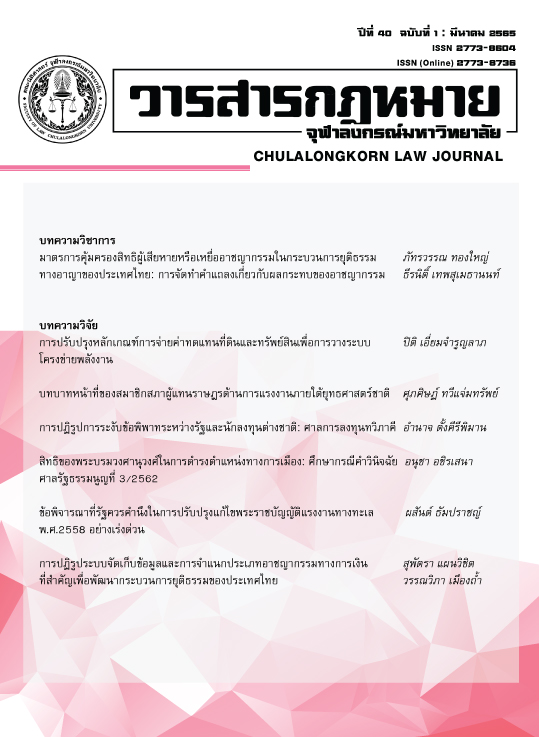การปรับปรุงหลักเกณฑ์การจ่ายค่าทดแทนที่ดินและทรัพย์สินเพื่อการวางระบบโครงข่ายพลังงาน
Main Article Content
บทคัดย่อ
ค่าทดแทนสำหรับการรอนสิทธิในทรัพย์สินเพื่อการวางระบบโครงข่ายพลังงานนั้น จะต้องสะท้อนและครอบคลุมถึงผลกระทบอันเกิดจากข้อจำกัดการใช้ประโยชน์ของทรัพย์สินที่ถูกรอนสิทธิโดยไม่ทำให้ผู้รับค่าทดแทนมีฐานะร่ำรวยขึ้นจากการได้รับค่าทดแทนดังกล่าว เนื่องจากค่าทดแทนนั้นเป็นส่วนหนึ่งของต้นทุนในการให้บริการพลังงานซึ่งจะเป็นภาระของผู้ใช้พลังงานในท้ายที่สุด อย่างไรก็ตาม การประเมินผลสัมฤทธิ์ของกฎหมายโดยคณะผู้วิจัยร่วมกับสำนักงานคณะกรรมการกำกับกิจการพลังงานและการศึกษากฎหมายในเชิงเปรียบเทียบแสดงให้เห็นว่าประกาศคณะกรรมการกํากับกิจการพลังงาน เรื่อง หลักเกณฑ วิธีการ เงื่อนไข เกี่ยวกับการกําหนดและจ่ายค่าทดแทน พ.ศ. 2552 ที่แก้ไขเพิ่มเติมโดยประกาศฯ ฉบับที่ 2 (พ.ศ. 2553) ประกาศฯ ฉบับที่ 3 (พ.ศ. 2556) ประกาศฯ ฉบับที่ 4 (พ.ศ. 2564) ยังไม่อาจให้ความเป็นธรรมแก่เจ้าของหรือผู้ครอบครองทรัพย์ซึ่งถูกรอนสิทธิได้เนื่องจากมีข้อจำกัดในการให้ค่าทดแทนแก่เจ้าของหรือผู้ครอบครองที่ดินซึ่งที่ดินตั้งอยู่ทั้งในและนอกเขตระบบโครงข่าย การขาดหลักเกณฑ์และวิธีการในการประเมินมูลค่าและกำหนดค่าทดแทนจากการที่สิทธิการใช้ทรัพย์สินถูกจำกัดมี และการกำหนดให้อัตราค่าทดแทนเพื่อการรอนสิทธิที่ตายตัว ด้วยเหตุนี้ คณะผู้วิจัยจึงได้เสนอร่างประกาศคณะกรรมการกำกับกิจการพลังงาน เรื่อง การกำหนดและจ่ายค่าทดแทนการรอนสิทธิฉบับใหม่ โดยกำหนดให้ผู้ทรงสิทธิซึ่งที่ดินตั้งอยู่ทั้งในและนอกเขตระบบโครงข่ายพลังงานมีสิทธิได้รับค่าทดแทนเพื่อการ รอนสิทธิ กำหนดรายละเอียดเกี่ยวกับการการกำหนดมูลค่าที่ดิน แทนที่การกำหนดจำนวนค่าทดแทนตายตัว ตามหลักการใช้ประโยชน์สูงสุดและดีที่สุดสำหรับที่ดิน และเปิดโอกาสให้มีการมอบหมายให้ผู้เชี่ยวชาญด้าน การประเมินมูลค่าทรัพย์สินอิสระช่วยดำเนินการกำหนดค่าทดแทนเพื่อการรอนสิทธิได้ ทั้งนี้ เพื่อให้การใช้ดุลพินิจของเจ้าหน้าที่ในการกำหนดค่าทดแทนเป็นไปอย่างเป็นระบบและสอดคล้องกับหลักการใช้ประโยชน์สูงสุดและ ดีที่สุดสำหรับที่ดิน งานวิจัยนี้จึงได้ให้นิยามและอธิบายถึงหลักเกณฑ์ในการพิจารณาศักยภาพของที่ดินและทางเลือกในการพัฒนาที่ดินในคู่มือเกี่ยวกับหลักเกณฑ์และวิธีการในการกําหนดและจ่ายค่าทดแทนในเขตระบบโครงข่ายพลังงาน
Article Details

อนุญาตภายใต้เงื่อนไข Creative Commons Attribution-NonCommercial-NoDerivatives 4.0 International License.
ลิขสิทธิ์และเนื้อหาในเว็บไซต์ของวารสารกฎหมาย (รวมถึง โดยไม่จำกัดเฉพาะ เนื้อหา รหัสคอมพิวเตอร์ งานศิลป์ ภาพถ่าย รูปภาพ ดนตรีกรรม โสตทัศนวัสดุ) เป็นกรรมสิทธิ์ของวารสารกฎหมาย และผู้ได้รับการโอนสิทธิทุกราย
1. วารสารกฎหมาย ให้อนุญาตให้คุณใช้สิทธิอันไม่เฉพาะเจาะจงที่สามารถถูกถอนเมื่อใดก็ได้ โดยไม่มีค่าใช้จ่าย ในการ
- เยี่ยมชมเว็บไซต์และเอกสารในเว็บไซต์นี้ จากคอมพิวเตอร์หรือเครื่องมือสื่อสารผ่านเว็บบราวเซอร์
- คัดลอกและจัดเก็บเว็บไซต์และเอกสารในเว็บไซต์นี้บนลงคอมพิวเตอร์ของคุณผ่านระบบความจำ cache
- สั่งพิมพ์เอกสารจากเว็บไซต์นี้สำหรับการใช้ส่วนตัวของคุณ
- ผลงานที่ได้รับการตีพิมพ์โดยวารสารกฎหมาย จุฬาลงกรณ์มหาวิทยาลัย ถูกคุ้มครองภายใต้ Creative Commons Attribution 4.0 International License ซึ่งอนุญาตให้ทุกคนสามารถคัดลอก แจกจ่าย ดัดแปลง ส่งต่อ ผลงานได้ ก็ต่อเมื่อผลงานและแหล่งข้อมูลได้รับการอ้างอิงอย่างเหมาะสม
2. วารสารกฎหมาย จุฬาลงกรณ์มหาวิทยาลัย สงวนสิทธิ์ไม่อนุญาตให้คุณใช้สิทธิอื่นใดที่เกี่ยวข้องกับเว็บไซต์และเอกสารบนเว็บไซต์นี้ เช่น การคัดลอก ดัดแปลง เปลี่ยนแปลง ส่งต่อ ตีพิมพ์ แจกจ่าย เผยแพร่ จัดแสดงในที่สาธารณะ ไม่ว่าจะในรูปแบบใดก็ตาม ซึ่งเว็บไซต์หรือเอกสารบนเว็บไซต์ โดยไม่อ้างอิงถึงแหล่งข้อมูลหรือโดยไม่ได้รับอนุญาตเป็นลายลักษณ์อักษรจากวารสารกฎหมาย จุฬาลงกรณ์มหาวิทยาลัย
3. คุณอาจขออนุญาตที่จะใช้เอกสารอันมีลิขสิทธิ์บนเว็บไซต์นี้โดยการเขียนอีเมลล์มายัง journal@law.chula.ac.th
4. วารสารกฎหมาย จุฬาลงกรณ์มหาวิทยาลัย เข้มงวดกับการคุ้มครองลิขสิทธิ์อย่างมาก หากวารสารกฎหมาย จุฬาลงกรณ์มหาวิทยาลัยพบว่าคุณได้ใช้เอกสารอันมีลิขสิทธิ์บนเว็บไซต์นี้โดยไม่ถูกต้องตามการอนุญาตให้ใช้สิทธิ ดังที่กล่าวไปข้างต้น วารสารกฎหมาย จุฬาลงกรณ์มหาวิทยาลัยอาจดำเนินคดีตามกฎหมายต่อคุณได้ เพื่อเรียกร้องค่าเสียหายที่เป็นตัวเงินและคำขอชั่วคราวให้คุณหยุดการใช้เอกสารดังกล่าว ทั้งนี้ คุณอาจถูกสั่งให้ชดใช้ค่าใช้จ่ายใดๆ ที่เกี่ยวข้องกับการดำเนินการตามกฎหมายนี้
หากคุณพบเห็นการใช้เอกสารอันมีลิขสิทธิ์ของวารสารกฎหมาย จุฬาลงกรณ์มหาวิทยาลัย ที่ขัดหรืออาจขัดต่อการอนุญาตให้ใช้สิทธิดังที่ได้กล่าวไปข้างต้น โดยเชื่อว่าได้ละเมิดลิขสิทธิ์ของคุณหรือของผู้อื่น สามารถร้องเรียนมาได้ที่ journal@law.chula.ac.th


